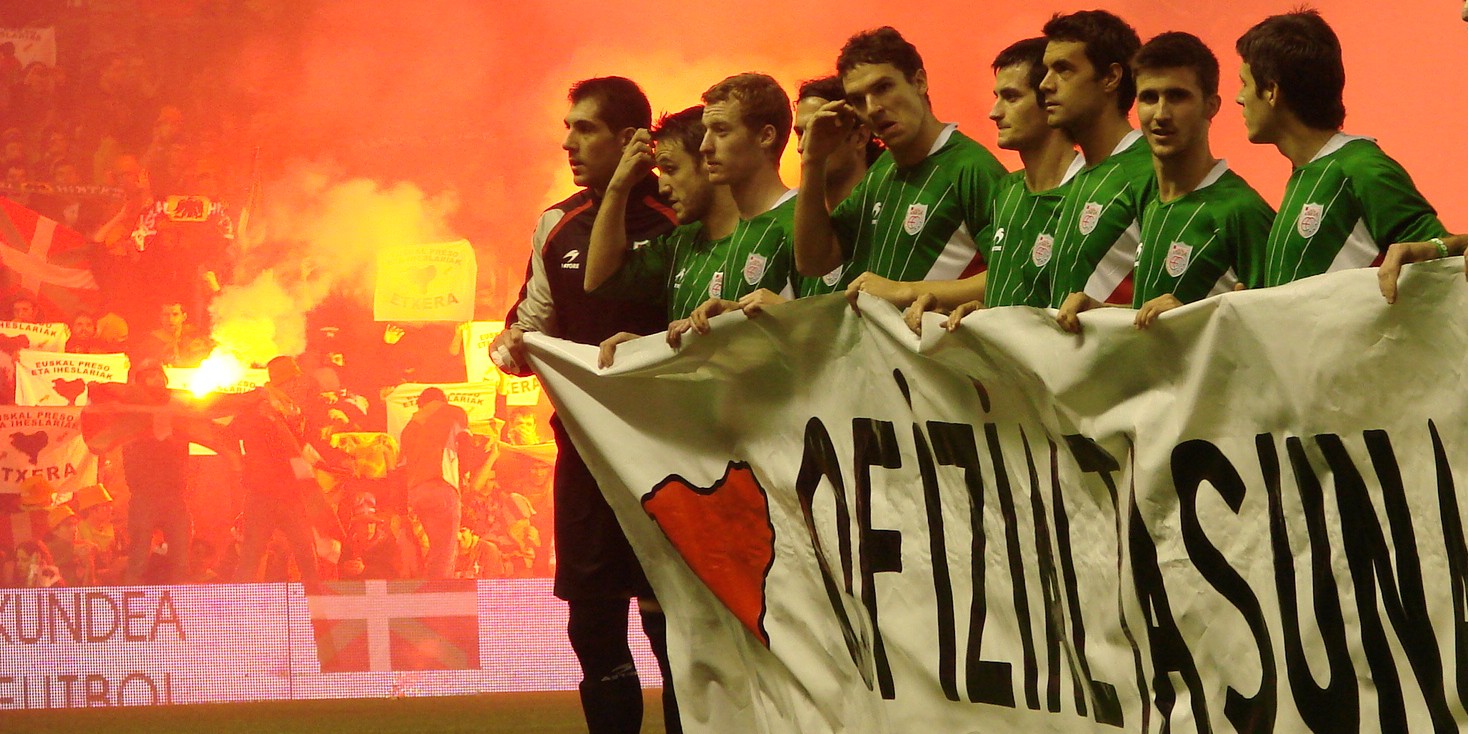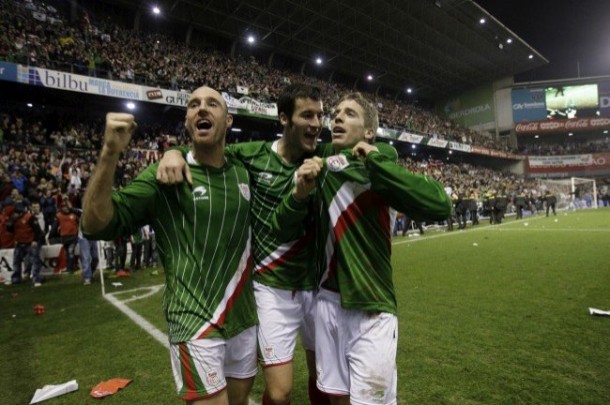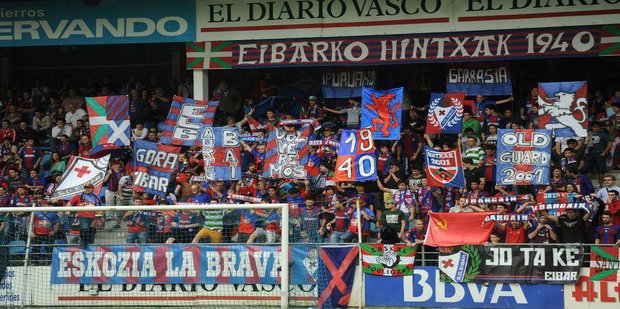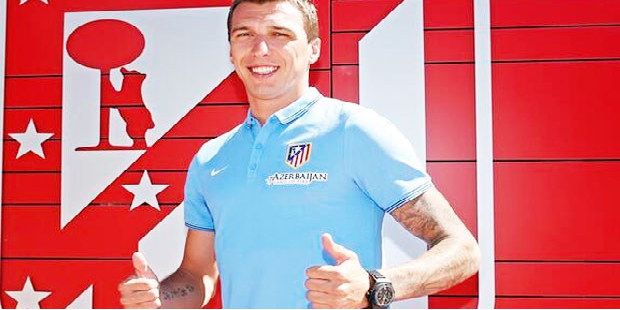- S.D. Eibar ready for maiden La Liga outing
- SD Eibar stengthen ahead of debut La Liga season
- Can ‘Super Mario’ live up to expectations in Madrid?
- MAN IN THE GROUND – Brentford 0 – 4 Osasuna
- Historic Basque derby welcomes S.D. Eibar to La Liga
- Munich to Madrid, via Brazil – Tony Kroos
- Rakitic in Spanish Switch
- Can Spain find redemption in Rio?
- Viva Espana! A season of redemption for Spanish football
- From the old to the new: who can fill the void in years to come for La Roja?
Could a true Basque national team ever compete at the highest level?
- Updated: 14 July, 2012


The rise to recognition of the talented Athletic Club side of Marcelo Bielsa during the 2011-12 season opened eyes all over the football world. One of the founding members of La Liga, the Bilbao club are widely known for their unique Basque-only selection policy – a policy that although less restrictive in recent years, is still unique in the sport.
The club’s ability to solely source players from the Basque Country and still maintain a competitive level of play is greatly impressive. However it becomes ever more impressive when you discover that the greater region of the Pais Vasco is home to just three million people.
To eliminate any further confusion, one must learn the difference between the greater Basque Country and the autonomous community of the Basque Country. The autonomous community (one of 17 in Spain and referred to as Euskadi) contains three provinces of Spain: Biscay, Gipuzkoa and Alava.
However, the greater region of the Basque Country (known as Euskal Herria) not only contains the aforementioned, but the Spanish autonomous community of Navarre and three bordering provinces in France (Labourd, Lower Navarre, and Soule). Athletic Club can theoretically sign any player who was either born in or raised in this region, but for the most part focus on players born in the four provinces with the Spanish border.
Despite the fame of Athletic, there is much more to Basque football than the side from San Mames. The region has an incredibly rich history in football and four of the original 10 clubs in La Liga were from the Basque Country (Athletic, Real Sociedad, Arenas Club de Getxo and Real Union).
Although the latter two teams no longer ply their trade in the top flight, they represent the importance of their region in the early stages of Spanish football. Athletic and Real Sociedad (who abandoned their own Basque-only policy in the 1980s) are joined in La Liga by Osasuna, a club located in Navarre.
People who are cognizant of the Basque Country have general images of the area, specifically its unique language and its well-documented struggle for independence. Although further discussion of that would prompt a political discussion not suitable for this article, it is fun to imagine: what if the Basque Country could have an actual national squad to compete in tournaments?
For those the least bit cognizant of Basque football, you will know that there is already a Basque ‘national team’. However, the selection is neither affiliated with UEFA nor FIFA. This prohibits the squad from participating in any tournament sanctioned by the two aforementioned governing bodies. The Euskal Selekzioa can only be permitted to compete in regional tournaments overseen by the Royal Spanish Football Federation (RFEF in Spanish). Moreso, the Basque national team’s participation is sparse; the squad has played in just three friendlies since 2008.
However for imagination’s sake, what if such a selection could play in international tournaments? A team selected from the best Basque players would actually be a formidable squad. Blessed with the technical ability we often associate with Spain’s national team, these players are adept at passing and moving. Given the talent from the area, a squad of Basques could feasibly advance to the knockout round of a UEFA or FIFA tournament.
The following team was selected under just one sole condition: that players were born in the Basque Country’s greater region, not just the Spanish autonomous community. This excludes players like Fernando Amorebieta (Venezuela) and Antoine Griezmann (France outside of the Basque Country) but will include players who were born in Navarre.
Goalkeepers
Gorka Iraizoz (Athletic), Asier Riesgo (Osasuna)
Iraizoz is a quality goalkeeper, starring for Athletic since his arrival in 2007 and would assuredly be the number-one choice on this squad. Riesgo, 28, started his youth career with Real Sociedad but moved to fellow Basque club Osasuna before the 2010-11 campaign.
Defenders
Jon Aurtenetxe (Athletic), Cesar Azpilicueta (Olympique Marseille), Andoni Iraola (Athletic), Inigo Martinez (Real Sociedad), Javi Martinez (Athletic), Nacho Monreal (Malaga), Mikel San Jose (Athletic)
Javi Martinez heads this list of serviceable defenders; however, there are no true superstars in this backline. Iraola has been a mainstay for Athletic for seven seasons, but Monreal has yet to cement himself in Malaga’s starting lineup permanent. However, the physical attributes of these players (size, strength, and speed) make for a well-rounded defence. All these players bar Iraola are 25-years-old or younger, promising a strong future.
Midfielders
Xabi Alonso (Real Madrid), Mikel Arteta (Arsenal), Oscar de Marcos (Athletic), Benat Etxebarria (Real Betis), Raul Garcia, (Atletico Madrid), Ander Herrera (Athletic), Ander Iturraspe (Athletic)
This batch of Basque midfielders may be the finest in a generation. Each of these guys, specifically Xabi Alonso, Mikel Arteta and Ander Herrera are astute passers (Alonso is arguably the finest long-range passer in Europe). The technical ability of this group is very impressive; the Athletic Club core of Herrera, Oscar De Marcos and Ander Iturraspe would ensure a smooth transition in the torch-passing of Basque midfielders. Few will recognize Garcia as a Navarre native; the Atletico Madrid man was loaned to Osasuna last year and led the club in goals.
Forwards
Aritz Aduriz (Athletic), Imanol Agirretxe (Real Sociedad), Fernando Llorente (Athletic), Iker Muniain (Athletic), Xabi Prieto (Real Sociedad), Markel Susaeta (Athletic), Gaizka Toquero (Athletic)
Each of the three wingers supply pace, energy, and excitement on the ball. Muniain may be the crown jewel – especially as he is not yet 20-years-old, but both Markel Susaeta and Xabi Prieto are stellar right wing players. Three of the four strikers are predictably Athletic men now that Aduriz has signed for Los Leones, but Imanol Agirretxe is a serviceable striker in his own right. Sadly, there really is no up-and-coming Basque striker waiting in the wings, but with Athletic’s youth system, a hot prospect could emerge within a year or two.
Hypothetical Starting Lineup: 4-3-3 Iraizoz; Iraola, Javi Martinez, Inigo Martinez, Monreal; Alonso, Arteta, Herrera; Susaeta, Llorente, Muniain.
How do you think this team would perform internationally?
Follow @icentrocampista






One Comment
You must be logged in to post a comment Login